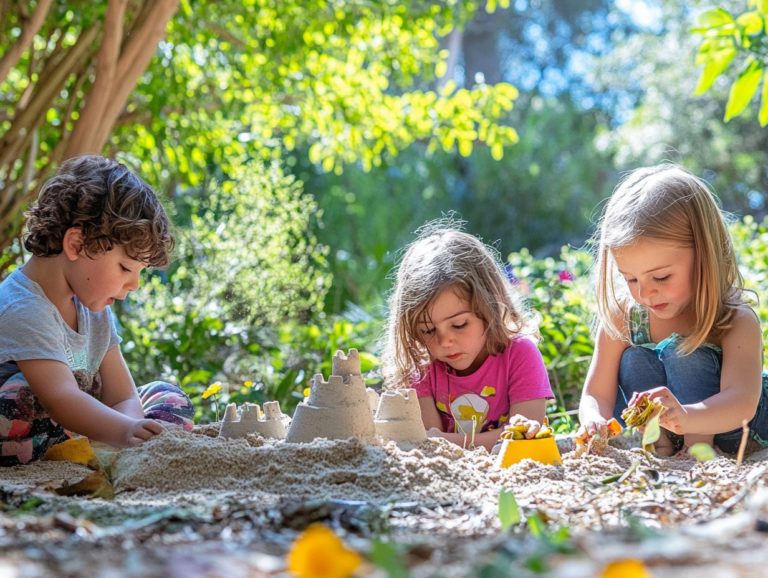What to Expect from Mindful Parenting?
In a fast-paced world brimming with distractions, mindful parenting presents a refreshing approach that prioritizes presence and connection.
It provides effective parenting skills and stress management strategies.
This article delves into the essence of mindful parenting.
It spotlights how it diverges from traditional methods and the myriad benefits it offers for both you and your children.
From fostering improved communication to enhancing emotional regulation, these mindful practices can truly transform your family dynamics and overall well-being.
You ll find practical tips and techniques designed to seamlessly weave mindfulness into your daily parenting routine.
These tips enhance your emotional awareness and stress reduction.
Start the journey today and witness the transformation in your family life while also managing anxiety.
Contents
- Key Takeaways:
- What Is Mindful Parenting?
- How Does Mindful Parenting Differ from Traditional Parenting?
- What Are the Benefits of Mindful Parenting?
- How Can Parents Practice Mindful Parenting?
- What Are Some Tips for Incorporating Mindful Parenting into Daily Life?
- Frequently Asked Questions (FAQs)
- Can mindful parenting help improve my child’s behavior?
- What challenges can I expect to face while practicing mindful parenting?
- How can I incorporate mindful parenting into my daily routine?
Key Takeaways:

- Mindful parenting involves being present and intentional in your interactions with your children.
- It differs from traditional parenting by promoting emotional regulation, empathy, and understanding.
- Benefits include improved communication, reduced stress, and increased self-control for both parents and children.
- Embracing mindful parenting fosters positive relationships and a culture of inclusion within the family.
What Is Mindful Parenting?
Mindful parenting is a powerful way to cultivate awareness and presence in your interactions with your children.
This approach emphasizes their emotional needs and overall well-being.
By integrating mindfulness methods used in personal development into your daily parenting routine, you can significantly enhance your communication skills.
This leads to better emotional regulation essential elements for nurturing positive relationships with your children.
When you embrace mindful parenting strategies, you facilitate your own personal growth.
You also provide vital support for your child’s development and behavior change.
This creates a nurturing learning space that fosters resilience against anxiety and stress, promoting better mental health.
How Does Mindful Parenting Differ from Traditional Parenting?
Mindful parenting sets itself apart from traditional approaches by championing a conscious, present-focused method to raising children.
It prioritizes emotional awareness, empathy, and compassion, integrating techniques from the Daring Leadership Institute.
While traditional models often lean on authoritarian tactics and reactive discipline, mindful parenting invites you to engage in active listening and reflective practices.
This creates an environment where your children feel genuinely understood and supported.
Such a transformative shift encourages positive behavior change and nurtures strong, healthy relationships.
It empowers you with essential coaching techniques needed to enhance your child’s emotional regulation and overall development.
What Are the Benefits of Mindful Parenting?
The benefits of mindful parenting are truly multifaceted.
They offer you enhanced communication skills, improved emotional regulation, and deeper emotional awareness all contributing to healthier family dynamics.
By embracing mindfulness, you create a nurturing environment that alleviates anxiety for both you and your children.
This fosters resilience and overall well-being.
When you prioritize self-care and embody empathy and compassion, you empower your family to cultivate positive relationships.
This approach facilitates effective behavior change and ensures that every member thrives within a supportive framework centered on personal growth.
It promotes curated growth journeys.
1. Improved Communication and Connection with Children
One of the most significant benefits of mindful parenting is the enhancement of communication skills between you and your child. This fosters a deeper connection and mutual understanding.
As a mindful parent, you engage in active listening and offer reflective responses. This creates an open dialogue that addresses emotional needs and boosts emotional regulation.
This practice not only strengthens the bond you share but also cultivates an environment of trust and respect, essential for nurturing positive relationships and improving team performance.
By incorporating techniques such as validating feelings, you can help your child articulate their emotions more clearly. For example, when your child is upset about losing a favorite toy, you might say, “I see you’re really sad about that; it s perfectly okay to feel upset.”
This response acknowledges their feelings and encourages them to explore emotions, fueling their emotional growth!
Practicing mindful breathing exercises together during stressful moments can empower your child to manage their emotions independently. This ultimately leads to healthier interactions.
Through these mindful techniques, you create an emotionally intelligent environment where your child feels safe to express themselves. This enhances both their overall well-being and your relationship, much like fostering a supportive professional environment.
2. Reduced Stress and Anxiety for Both Parents and Children
Mindful parenting can significantly reduce stress and anxiety for both you and your children by creating a calm, present-focused atmosphere at home. By employing techniques like mindful breathing and self-reflection, you can demonstrate effective stress management strategies.
This empowers your children to develop their own coping mechanisms, which are ways to deal with stress or difficult emotions. This dual approach enhances everyone s well-being and fosters emotional regulation.
Incorporating practices such as gratitude journaling and routine family mindfulness sessions allows you to instill resilience and deepen emotional connections within your family.
For instance, when you openly discuss your feelings during tough moments, you show vulnerability. This encourages your children to express their own emotions.
This normalizes emotional exploration and reinforces the notion that seeking help during challenging times is perfectly acceptable, promoting healthier mental health practices.
Engaging in regular mindful moments, like nature walks or simple breathing exercises, directly helps manage stress. These moments create a harmonious atmosphere, benefiting everyone in your home.
3. Increased Emotional Regulation and Self-Control

Increased emotional regulation and self-control are among the key benefits of mindful parenting. This approach allows you to model these essential skills for your children.
By practicing self-awareness and emotional regulation techniques, you can respond thoughtfully rather than react impulsively, ultimately fostering meaningful behavior change in your kids.
This approach enhances emotional awareness within your family, equipping your children with the tools they need to manage their emotions effectively. They can also develop flexible routines to handle various situations.
When you implement practices such as deep breathing exercises, reflective listening, and consistent routines, you create an environment where emotional intelligence can truly flourish.
These strategies not only help you maintain your composure during challenging moments but also serve as invaluable lessons for your children.
As they observe how you handle stress, they begin to adopt similar techniques, leading to improved self-regulation and a deeper understanding of their emotional landscape.
This transformational process minimizes conflicts at home and instills resilience, empowering your children to navigate life s challenges with greater ease and confidence.
4. Enhanced Empathy and Understanding
Mindful parenting nurtures your ability to cultivate empathy and understanding. This allows you to better discern and respond to your child’s emotional needs. A deeper connection fosters positive relationships that transcend mere authority, creating a bond rooted in mutual respect and compassion.
By embracing mindfulness, you can create an environment where your child feels valued and understood. This paves the way for authentic emotional exchanges, similar to creating successful professional relationships.
With this approach, you become attuned to the subtle cues of your child s feelings. You also model emotional regulation yourself. Practicing patience and active listening helps you address immediate challenges while teaching your child the significance of empathy in daily interactions. This, in turn, enhances their leadership development.
As a result, your child learns to navigate their emotional landscapes more effectively. This increases the likelihood of developing healthy relationships with peers and adults alike. Such nurturing practices enhance self-esteem and establish a safe space for vulnerability, where your child knows their voice matters. Ultimately, this leads to lifelong connections grounded in understanding and compassion, contributing to better team performance in various life aspects.
How Can Parents Practice Mindful Parenting?
Embrace mindful parenting by incorporating mindfulness techniques designed to promote emotional regulation, manage stress, and enhance well-being for both you and your children. These practices are essential for effective anxiety management and fostering a culture of inclusion within the family.
Weave in practices such as mindful breathing, meditation, and active listening into your daily routines. This establishes a nurturing environment that supports emotional development and fosters deeper connections with your children, helping to develop their leadership skills and emotional intelligence.
This intentional parenting approach amplifies your ability to provide support and strengthens the bonds within your family. You cultivate a home filled with inclusion and understanding, much like a high-performing workplace.
1. Mindful Breathing and Body Awareness
Mindful breathing and body awareness serve as essential practices in mindful parenting. They enable both you and your children to cultivate a deep sense of calm and emotional regulation. Incorporating simple breathing exercises and body scans helps your family connect with the present moment, enhancing awareness of emotional states and reactions, which is crucial for child development.
This approach helps manage stress and nurtures an understanding of the bodily cues tied to emotions. Ultimately, it promotes overall well-being and personal reflection.
Engaging in these techniques as a family whether taking deep breaths side by side or practicing gentle stretching creates a supportive environment where emotional expression is warmly encouraged. Choose a quiet space to sit together, allowing everyone to focus on their breath and tune into how their bodies feel. This can be considered as doing inner work.
This shared experience not only fortifies family bonds but also equips each member with invaluable tools for emotional regulation and stress management. Practicing regularly inspires your children to identify and label their feelings, paving the way for healthier communication and resilience in challenging situations, an approach often highlighted in positive parenting.
2. Non-Judgmental Observation and Acceptance
Non-judgmental observation and acceptance are essential elements of mindful parenting. They allow you to witness your child’s behaviors and emotions without immediate reactions or criticisms. This approach nurtures emotional awareness and understanding, enabling you to respond with empathy and compassion instead of frustration or judgment.
By creating a safe space for your children to express themselves freely, you can cultivate stronger emotional connections and promote healthy behavioral changes within your family. Incorporating this practice into your everyday life can be both simple and transformative.
For instance, when your child has a tantrum, instead of reacting with anger or frustration, take a moment to observe the situation without labeling the behavior as bad. Techniques like deep breathing, pausing before you respond, and reflecting on your feelings can help you maintain this mindful stance.
Encouraging your children to articulate their feelings not only fosters open communication but also helps them develop emotional intelligence. This approach enhances your parent-child relationship while equipping your children with valuable tools for emotional regulation and resilience.
3. Emotional Regulation and Self-Compassion
Emotional regulation and self-compassion are essential elements of mindful parenting that empower you to manage your emotions effectively while creating a loving atmosphere for your children. By practicing self-compassion, you can acknowledge your feelings and imperfections without indulging in harsh self-judgment. This balance not only benefits you but also serves as a powerful example for your children, teaching them the significance of self-care and emotional awareness.
When you integrate techniques such as deep breathing, mindfulness meditation, or gentle affirmations into your daily routine, you cultivate a heightened sense of awareness that enhances your emotional regulation. Engaging in self-check-ins, which means taking a moment to assess your feelings, can also deepen your understanding of how you respond to stressors.
Sharing your feelings and experiences with your children fosters an environment of transparency and connection. It shows them that it’s perfectly normal to experience a range of emotions. This mindful approach nurtures your well-being while simultaneously strengthening your child’s ability to regulate their emotions, promoting a resilient family dynamic.
4. Setting Boundaries and Limits with Love

Setting boundaries and limits with love is essential in your journey as a mindful parent. This fosters positive relationships while respecting your children’s emotional needs. As a mindful parent, you establish clear and consistent guidelines, all while remaining empathetic to your child s feelings. This creates an environment where your children feel both secure and understood, striking a balance that encourages healthy behavior change and emotional regulation.
Through this balance, they learn the importance of boundaries in their own relationships.
By incorporating strategies like active listening and open communication, you can skillfully navigate the delicate dance between discipline and affection. For instance, using “I statements” allows you to express your feelings while simultaneously acknowledging your child’s perspective. Involving your children in the creation of these boundaries not only enhances their commitment to following them but also promotes a sense of ownership and responsibility.
Ultimately, setting loving limits cultivates mutual respect and equips your children with the necessary skills to establish their own healthy boundaries in future social interactions. This approach is supported by parental support systems.
What Are Some Tips for Incorporating Mindful Parenting into Daily Life?
Incorporating mindful parenting into your daily life is entirely achievable with practical strategies that elevate your self-care, foster positive relationships, and effectively manage stress. Resources from organizations like BetterUp and insights from experts such as Bren Brown can be highly beneficial.
By making simple adjustments to your routines such as dedicating time for reflection, practicing gratitude, and engaging in mindful activities with your children you can significantly enhance your family dynamics.
These intentional practices support managing emotions and cultivate a culture of mindfulness within your home, benefiting both you and your children in profound ways. This culture can be further enriched through creative solutions and specific time management techniques.
1. Start Small and Be Patient
Starting small and embracing patience are key principles for integrating mindful parenting into your daily life. This approach allows for gradual adjustments and meaningful growth. By introducing one mindfulness technique at a time, you can sidestep overwhelm and cultivate a sustainable approach to stress management.
Take, for example, a simple technique like mindful breathing. Practicing it together during family moments perhaps at bedtime or during a shared meal can be incredibly effective.
Encouraging each family member to take a few deep breaths fosters calmness and can transform your home into a peaceful sanctuary.
Incorporating visual aids, such as a mindfulness jar filled with vibrant materials, can capture your child’s attention and act as a tangible reminder of the importance of staying present. Remember, patience is vital on this journey; it allows everyone in the family the time they need to learn and embrace these new practices.
Ultimately, this strengthens emotional bonds while navigating the beautiful challenges of parenthood together.
2. Model Mindful Behavior for Your Children
Modeling mindful behavior for children serves as a powerful method to weave mindfulness practices into the fabric of family life. It showcases emotional awareness and self-regulation in real-time.
When you consistently demonstrate mindful behavior, your children are more likely to embrace these practices themselves, nurturing positive relationships and creating a supportive environment.
By embodying the principles of mindful parenting, you enhance your own well-being while guiding your children toward a healthier emotional landscape.
Consider incorporating daily mindfulness activities like meditation or deep-breathing exercises into your routine. These practices equip you with effective coping strategies and provide your children with practical techniques to manage stress and anxiety.
Initiating open conversations about feelings creates a safe space where emotions are validated and expressed freely. Participating in family yoga sessions or enjoying nature walks further emphasize the importance of being present.
Insights from experts like Amy Saltzman can enhance these practices. By integrating these mindful practices into your daily life, you cultivate an atmosphere rich in understanding and compassion, ultimately giving your children the power to navigate their emotional experiences with greater ease and confidence.
Start your mindful journey today!
For further reading and resources on mindful parenting, consider exploring additional materials that can enhance your understanding and practice.
3. Practice Gratitude and Mindful Reflection
Practicing gratitude and mindful reflection is an essential technique in mindful parenting that promotes emotional regulation and supports personal growth for both you and your children. By regularly acknowledging and appreciating the positive moments in your day, you cultivate a mindset of abundance and resilience, enhancing your emotional well-being. This intentional focus on gratitude encourages deeper connections and fosters a nurturing atmosphere where everyone’s emotional needs are met.
Incorporating these practices into your daily routines can create a dynamic where both you and your kids learn from one another. Simple activities, such as a nightly gratitude circle before bed, allow each family member to share something they appreciated that day. This strengthens bonds and enhances communication skills.
Keeping a family gratitude journal highlights growth and invites reflection on the good times, making it easier to navigate challenges when they arise. You can also integrate mindful reflection sessions during family walks or meals, providing perfect opportunities to discuss feelings and experiences.
By weaving these practices into the fabric of your family life, emotional regulation becomes more intuitive, and personal growth flourishes for everyone involved. Incorporating taking care of yourself as a parent into these routines ensures that parents are equipped to nurture their children effectively.
4. Seek Support and Guidance from Other Mindful Parents
Seeking support and guidance from other mindful parents can significantly elevate your journey in practicing mindful parenting, offering you valuable insights and encouragement. By joining a community of like-minded individuals, including those from BetterUp and the Daring Leadership Institute, you foster a sense of belonging and shared experiences that enrich your personal growth and emotional regulation.
Engaging with other parents allows you to exchange tips, learn new mindfulness techniques, and strengthen positive relationships, creating a supportive network that benefits all families involved. Connecting with fellow mindful parents presents a unique opportunity to discover how mindfulness can transform parenting and how others, including experts like Mark Bertin, Elisha Goldstein, and Amy Saltzman, navigate similar challenges, whether it’s managing stress, ADHD, or nurturing emotional intelligence in their children.
This interaction cultivates a rich dialogue about effective strategies, where wisdom is shared and experienced firsthand. These connections remind you that you are not alone embrace the journey together!
The encouragement and understanding that arise from these relationships, possibly influenced by thought leaders like Bren Brown, can profoundly impact your experience, leading to increased resilience and joy in parenting. Being part of such a network enhances your accountability and inspires your commitment to mindful practices, ultimately contributing to a nurturing environment for both you and your children.
Frequently Asked Questions (FAQs)

What can I expect from practicing mindful parenting?
By practicing mindful parenting, you can expect to develop a deeper connection with your child, improve communication, reduce stress, and become more present and aware in your parenting journey. Incorporating mindful awareness and learning from professional insights can further enhance these benefits.
How does mindful parenting differ from traditional parenting?
Mindful parenting focuses on being present and fully aware in the moment, rather than reacting from autopilot. It emphasizes understanding and meeting your child’s needs, rather than simply enforcing rules and discipline. This approach supports continuous skill development for both parents and children.
Will practicing mindful parenting make me a perfect parent?
No, mindful parenting does not promise perfection. It is a continuous practice and journey of self-awareness and growth, and you may still make mistakes. However, it can help you become a more compassionate and understanding parent.
We encourage you to share your own experiences with mindful parenting. Together, we can learn and grow.
Can mindful parenting help improve my child’s behavior?
Yes, practicing mindful parenting creates a calmer environment for your child. This can lead to improved behavior.
What challenges can I expect to face while practicing mindful parenting?
Mindful parenting can be challenging at times. It requires patience and understanding your own feelings while letting go of rigid expectations.
You may also face resistance from your child or struggle to find time for self-care and reflection.
How can I incorporate mindful parenting into my daily routine?
You can incorporate mindful parenting into your daily routine by setting aside a few minutes each day for mindfulness practices. Try deep breathing, mindful eating, or simply being present with your child.
Imagine the joy in your child’s face as you practice mindfulness together during meals or bath time! Reading books by experts like Mark Bertin and Elisha Goldstein can provide additional strategies for integrating these practices seamlessly.
Start your mindful parenting journey today and experience the positive changes in both your and your child’s life!






